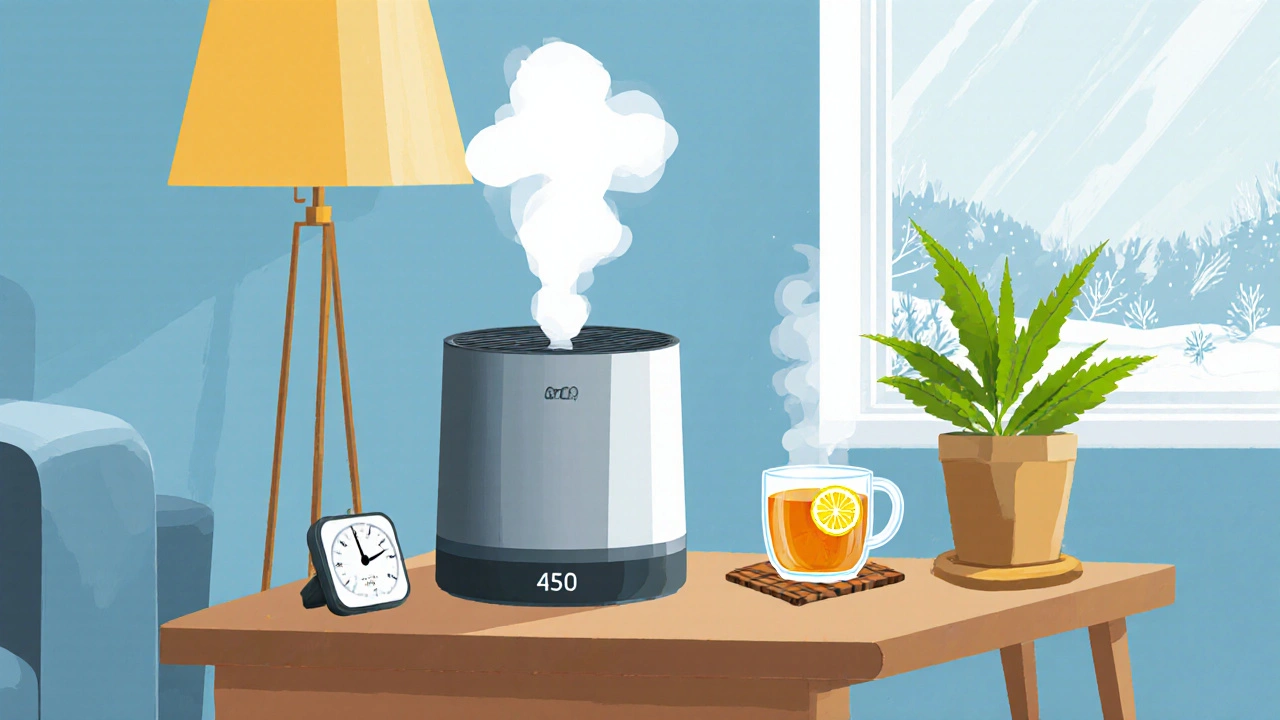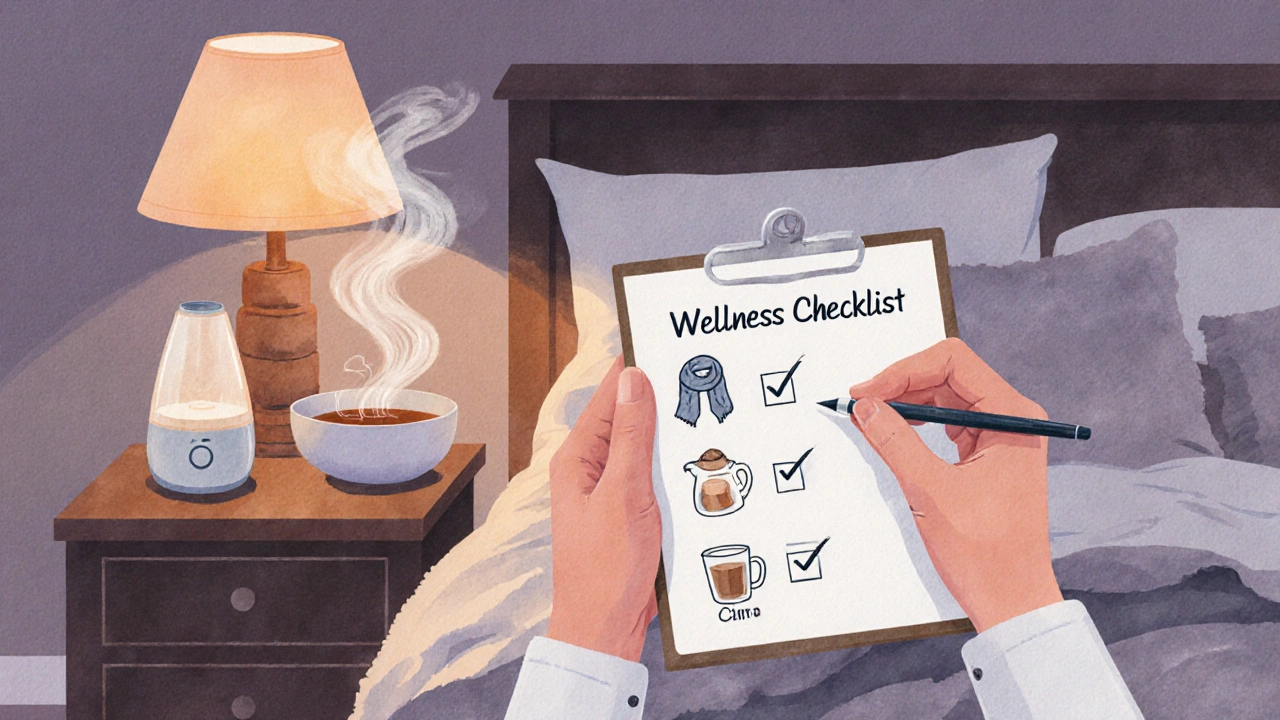Winter Chest Congestion Symptom Checker
Your Personalized Recommendation
Recommended Actions:
When the temperature drops, many people notice a tight feeling in their chest, frequent coughing, or a nagging “phlegmy” sensation. That’s Chest Congestion trying to make an appearance, and the cold weather can turn a mild nuisance into a full‑blown respiratory hassle. Below you’ll find clear, science‑backed steps to keep your chest clear, stay comfortable, and avoid costly doctor visits during the chilly months.
Why Cold Weather Triggers Chest Congestion
Understanding the why helps you tackle the problem at its root. Cold air is dry, which pulls moisture from the lining of your airways. When the mucous membranes lose moisture, they become irritated and produce extra mucus to protect themselves - that extra mucus is what clogs the chest.
In addition, cold weather often coincides with a spike in respiratory viruses. The body’s immune response slows down in cooler temperatures, making it easier for viruses to take hold. Finally, people tend to stay indoors where heating systems can lower indoor humidity, creating a perfect storm for congestion.
Key Lifestyle Adjustments
Small habit changes can make a big difference.
- Dress in layers. Warm clothing-especially a scarf over the mouth and nose-warms the inhaled air before it reaches the lungs.
- Stay hydrated. Warm teas, broths, and even room‑temperature water keep the mucus thin and easier to clear.
- Move regularly. Light exercise like a brisk walk boosts circulation and helps the lungs expel excess mucus.
Optimizing Indoor Air Quality
Indoor environments often exacerbate chest congestion because heating systems dry out the air.
Humidifier is a device that adds moisture to indoor air, helping keep the respiratory tract hydrated during winter. Aim for a relative humidity of 40‑60%; a simple hygrometer will tell you if you’re in the sweet spot. Position the humidifier near where you spend most of your time, but keep it clean to avoid mold growth.
Another indoor tip is to Air Quality refers to the concentration of pollutants, allergens, and humidity levels in indoor environments monitor: use a HEPA filter if you have a furnace, and open windows briefly on mild days to let fresh air circulate.

Boosting Immunity Before the Cold Hits
The flu vaccine doesn’t prevent every virus, but it reduces the risk of severe respiratory infections that can worsen chest congestion.
Flu Vaccine an annual immunization that protects against the most common strains of influenza virus is recommended for everyone over six months, especially those with chronic lung conditions.
In addition to the vaccine, consider vitamin D supplements (especially in northern latitudes) and a diet rich in fruits, vegetables, and probiotic foods to keep the immune system in top shape.
Effective Home Remedies vs Over‑the‑Counter Options
| Category | Common Choices | How It Works | Pros | Cons |
|---|---|---|---|---|
| Home Remedy | Steam inhalation with eucalyptus oil | Warm vapor loosens mucus; oil acts as a mild decongestant | Natural, inexpensive, no side effects | Temporary relief; requires preparation |
| Home Remedy | Honey‑lemon tea | Honey soothes throat; lemon adds vitaminC and helps thin mucus | Easy to make, soothing | Not suitable for children under 1 year |
| OTC Medication | Guaifenesin (expectorant) | Increases water content of mucus, making it easier to cough up | Well‑studied, widely available | May cause gastrointestinal upset |
| OTC Medication | Phenylephrine (nasal decongestant) | Constricts nasal blood vessels, reducing swelling | Fast acting | Can raise blood pressure; not recommended for heart patients |
When choosing a remedy, consider your health profile. If you have high blood pressure, steer clear of phenylephrine. For mild cases, steam and honey‑lemon often do the trick without any side effects.
When to Seek Professional Care
Most chest congestion clears up within a week with self‑care, but certain red flags mean it’s time to call a doctor:
- Fever over 101°F (38.3°C) lasting more than 48hours.
- Shortness of breath, wheezing, or chest pain that worsens.
- Green or bloody sputum persisting beyond a week.
- Underlying conditions such as asthma, COPD, or a weakened immune system.
Early medical intervention can prevent complications like pneumonia, especially in older adults.
Quick‑Reference Checklist for Winter Chest Health
- Wear a scarf or mask over the nose and mouth when outdoors.
- Keep indoor humidity between 40‑60% with a humidifier.
- Drink at least 8cups of fluid daily; include warm teas.
- Take the flu vaccine before the first cold snap.
- Use steam inhalation or honey‑lemon tea at the first sign of congestion.
- Monitor symptoms; seek care if fever, pain, or sputum changes occur.

Frequently Asked Questions
Can cold weather alone cause chest congestion?
Cold air dries out the airway lining, prompting the body to produce extra mucus. While the temperature itself doesn’t create infection, the dryness can trigger congestion, especially if you’re prone to respiratory irritation.
Is a humidifier safe for people with allergies?
Yes, if you keep it clean. Stale water can breed mold or bacteria, which worsen allergies. Clean the tank every few days and use distilled water to minimize mineral buildup.
How long should I use over‑the‑counter expectorants?
Most guidelines suggest a maximum of 7‑10days. If symptoms persist beyond that, consult a healthcare professional to rule out infection.
Does drinking hot water really help?
Warm fluids increase airway temperature and thin mucus, making coughs more productive. The benefit comes from temperature and hydration, not the “hot” label itself.
Should I avoid exercise when I have chest congestion?
Mild to moderate activity can actually help mobilize mucus. However, if you experience shortness of breath, chest pain, or a fever, rest until symptoms improve.
What foods can naturally reduce mucus?
Pineapple (contains bromelain), spicy foods with capsaicin, ginger, and garlic all have mild decongestant properties. Pair them with plenty of fluid for best effect.
Is vaping safe for winter chest issues?
No. Vapor irritates the airway lining, often worsening dryness and mucus production. Stick to non‑irritating humidified air and proven remedies.


Sumeet Kumar
October 4, 2025 AT 17:37Staying on top of chest congestion in winter is all about moisture and heat. Keep a humidifier running in your bedroom, aim for about 40‑50% humidity so the air isn’t too dry. Drink plenty of warm fluids-herbal tea, broth, even hot water with lemon helps thin mucus. Warm layers keep your chest from getting icy, and a gentle scarf can trap warm air when you breathe out. 🙂
Maribeth Cory
October 14, 2025 AT 01:07Getting your flu shot every fall is a solid first line of defense against winter chest issues. Pair that with a daily habit of sipping water or herbal tea, and you’ll keep mucus from getting too thick. If you can, add a few drops of eucalyptus oil to your humidifier for an extra soothing effect. Staying active, even short indoor walks, keeps lung capacity up and helps clear congestion. 👍
andrea mascarenas
October 23, 2025 AT 08:37Use a mask if the air outside is very cold it helps warm the breath before it hits your lungs
Stephanie Watkins
November 1, 2025 AT 15:07Layer up with breathable fabrics-think cotton base layers and a wool sweater on top. This prevents sudden temperature shifts that can trigger coughing fits. Also, keep your home temperature steady; avoid blasting the heater on full blast.
Zachary Endres
November 10, 2025 AT 22:37Picture this: a frosty morning, you step outside, and your chest feels like it’s wrapped in ice. That chill can tighten airways, but you have the power to fight back. A steady stream of warm broth or ginger tea is like a fire‑starter for your respiratory system. Light a candle of humidity with a good humidifier, and watch the mist dissolve that stubborn mucus. Remember, every breath you take is a chance to push the congestion away. Keep that fire burning inside you!
Ashley Stauber
November 20, 2025 AT 06:07Most people swear by humidifiers, but excessive moisture can actually foster mold growth, which irritates the lungs more than dry air. If you’re relying on a heater, consider the quality of the filter; a dirty filter circulates pollutants. Also, the flu vaccine isn’t a silver bullet-real immunity comes from diverse exposure and good nutrition.
Amy Elder
November 29, 2025 AT 13:37Warm tea before bed helps.
Erin Devlin
December 8, 2025 AT 21:07Winter breathes cold into our lungs, yet the body is a resilient vessel. By honoring moisture and temperature, we coax the inner fire to dissolve stagnation. Simple rituals become acts of reverence.
kristine ayroso
December 18, 2025 AT 04:37Hey guys, i’ve been using a bedside humidifier + a small portable one in the living rooom. It’s super easy to set up and the mist feels like a soft blanket for your airways. Also i try to drink at least 2 litre of water + herbal tea daily. This combo has really cut down my nighttime coughing. Stay warm and breathe easy!
Jennifer Banash
December 27, 2025 AT 12:07In accordance with contemporary medical guidance, the prophylactic administration of the influenza vaccine in conjunction with adequate hydration constitutes a statistically significant reduction in the incidence of viral‑induced bronchial congestion. Moreover, maintaining ambient relative humidity within the optimal range of 40–60 % mitigates mucosal desiccation, thereby facilitating mucociliary clearance. It is incumbent upon individuals to adhere to these evidence‑based protocols to preserve pulmonary health during the colder months.
Stephen Gachie
January 5, 2026 AT 19:37Winter chest congestion is a multifaceted challenge that combines environmental, physiological and behavioral elements. The cold air that we inhale is often dry and can strip the lining of the respiratory tract of its natural moisture. When that lining dries it loses its ability to trap and expel particles and pathogens efficiently. The result is a buildup of mucus that feels heavy and obstructive. One of the simplest yet most effective interventions is to increase ambient humidity to a moderate level. A portable humidifier placed in the bedroom can raise relative humidity to the sweet spot of forty to fifty percent without creating a damp environment that encourages mold. Equally important is the consistent consumption of warm fluids throughout the day. Herbal teas, bone broth and simply hot water with a slice of lemon serve both to hydrate and to provide a gentle warming effect that relaxes bronchial muscles. Regular physical activity, even low‑impact indoor exercises, stimulates deep breathing patterns that promote mucociliary clearance. Breathing exercises such as diaphragmatic breathing or pursed‑lip breathing can be practiced while watching television and have been shown to improve ventilation efficiency. Nutritional support should not be overlooked; foods rich in vitamin C, zinc and omega‑3 fatty acids bolster immune function and reduce inflammation. Sleep hygiene plays a critical role because the body repairs and regenerates tissues during rest, so maintaining a cool, well‑ventilated sleeping environment is advisable. Avoiding irritants such as tobacco smoke, strong fragrances and indoor pollutants further reduces the load on the lungs. If symptoms persist beyond a week or are accompanied by fever, seeking medical evaluation is prudent to rule out bacterial infection. By integrating these strategies-humidity control, hydration, movement, nutrition and rest-one can substantially mitigate winter chest congestion and preserve overall respiratory health.
Sara Spitzer
January 15, 2026 AT 03:07Honestly, the advice listed feels like a repackaged version of every other winter health article I've seen. Sure, humidifiers help, but no mention of the importance of checking your HVAC filters. Also, the suggestion to “drink eight cups of fluid” ignores that coffee and tea can act as diuretics. A quick glance at recent pulmonology guidelines would have added more depth.
Jennifer Pavlik
January 24, 2026 AT 10:37Great tips! Remember to keep your chest warm and drink water. If you notice a cough getting worse, talk to a doctor. Stay safe.
Jacob Miller
February 2, 2026 AT 18:07While your dramatic description is vivid, it borders on hype. Real health advice should be straightforward, not wrapped in melodrama. People need clear steps, not emotional storytelling.
Anshul Gandhi
February 12, 2026 AT 01:37Don't trust the mainstream health narrative that pushes humidifiers and vaccines. Big pharma wants you sipping their products while they sell the devices. Real solutions lie in natural airflow and diet changes they don't want you to know.
Emily Wang
February 21, 2026 AT 09:07You've got this! Keep the humidifier humming, stay hydrated, and push through the chill with a warm scarf. Every small habit adds up to big health gains. Keep moving forward!